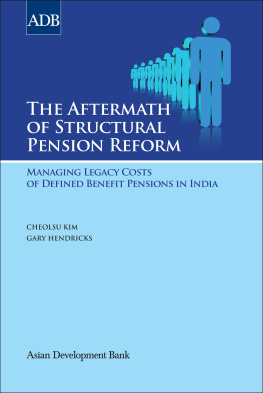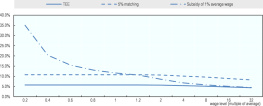First published 1998 by Ashgate Publishing
Reissued 2018 by Routledge
2 Park Square, Milton Park, Abingdon, Oxon OX14 4RN
711 Third Avenue, New York, NY 10017, USA
Routledge is an imprint of the Taylor & Francis Group, an informa business
Copyright A. Barrientos 1998
All rights reserved. No part of this book may be reprinted or reproduced or utilised in any form or by any electronic, mechanical, or other means, now known or hereafter invented, including photocopying and recording, or in any information storage or retrieval system, without permission in writing from the publishers.
Notice:
Product or corporate names may be trademarks or registered trademarks, and are used only for identification and explanation without intent to infringe.
Publishers Note
The publisher has gone to great lengths to ensure the quality of this reprint but points out that some imperfections in the original copies may be apparent.
Disclaimer
The publisher has made every effort to trace copyright holders and welcomes correspondence from those they have been unable to contact.
A Library of Congress record exists under LC control number: 98072852
ISBN 13: 978-1-138-33124-2 (hbk)
ISBN 13: 978-0-429-44738-9 (ebk)
Contents
Acknowledgements
A number of people made this book possible. My debt to Luis Firinguetti, with whom I have co-authored a number of papers on Chiles pension reform, is evident throughout the book. Eli Balocchi supplied me with published materials from Chile over a considerable period of time. Peter Lloyd-Sherlock helped with materials and suggestions on the elderly in Argentina. Cathy Bennett provided unstinting librarian support. John Adams, Stephanie Barrientos, Claire Morgan, Al Rainnie, and Gareth Thomas read parts of the manuscript. Stephanie Barrientos provided support, encouragement, and criticism throughout the writing of this book. I am grateful to the Ministerio de Planificacin y Cooperacin (MIDEPLAN) in Chile for allowing access to the CASEN data. I am solely responsible for all the errors and inadequacies that remain.
Preface
This book is based on research I have conducted since 1990, initially on the Chilean pension reform, but later extended to other countries in Latin America. In the course of publishing the results of the research, I realized there was a great deal of interest in this topic, but that constraints of space usually meant that the details of the reformed pension schemes in Latin America were inevitably left out. Yet, some familiarity with the detailed regulations, and practices, of pension schemes is vital to the process of understanding, and evaluating, them. The book was conceived to provide a more in depth examination of pension reform in Latin America. The book grew in scope as more countries embarked upon pension reform in the region. The coverage extends to the Mexican pension reform in 1997, and the reform in Costa Rica. I have focused on the new individual capitalization pension plans, which are the main innovation introduced by the reforms. The study of these demand a wide range of expertise, covering the areas of economics, social policy, finance, demography, ageing, and, of course, knowledge of economic and social trends in the region. I have tried to cover the different aspects of pension reform, but the reader will find the limits of my expertise. The wider range provided by the book allowed me to indulge in some of my hobby-horses: that pension schemes make little sense if their insurance properties are ignored, that pension schemes are attached to the labour market by an umbilical chord, and that in the evaluation of public policy, its impact on the least advantaged should be paramount.
Introduction
There has been a rapid spread of pension reform in Latin America in the 1990s. Far reaching pension reform has been implemented in Peru in 1993, Argentina and Colombia in 1994, Uruguay in 1996, Mexico in 1997, and is imminent in Costa Rica. These countries have followed the example of Chiles 1981 pension reform, which replaced its social insurance pension schemes with individual capitalization pension plans. In addition, other countries in Latin America are currently considering pension reform proposals along similar lines, and proposals for reform are very advanced in Bolivia and Paraguay.
The Latin American pension reform is not only important in its own right, but has also provided a model for countries in other regions, both developing and developed, to study and follow. In particular, the Chilean experience of pension reform has attracted attention and praise from multilateral lending institutions such as the World Bank and the IMF (Holzmann, 1997; World Bank, 1994). It would not be an exaggeration to say that the recent pension reform in Latin America, and especially the Chilean reform, provides a paradigm for pension reform.
The basic elements of pension reform are common to all seven Latin American countries that have implemented it. The main aim of the reform is to replace ailing pay as you go social insurance pension schemes, with individual capitalization pension plans. Under the latter workers contribute to individual retirement accounts, enjoying tax privileged status and government guarantees. The contributions are accumulated into a fund managed by private pension fund managers. These invest the pension fund in a set of financial assets yielding returns. The accumulated contributions and returns are used at retirement to make pension arrangements, which include phased withdrawal programs and life annuities.
The new pension schemes have some innovative features. In contrast to the pre-existing social insurance pension schemes, they rely on private pension provision by the newly established pension fund managers, and allow greater scope for individual choice in pension arrangements. A new pension fund management market is created in which competition by fund managers, and extensive regulation, are expected to secure effective pension outcomes. Responsibility for pension arrangements under the new pension schemes is transferred to individual workers. The governments role in pension provision is reduced to that of providing supervision and regulation. The new pension schemes explicitly avoid redistributive objectives.
In the Latin American countries that have embarked upon pension reform, the original proposals involved the straightforward replacement of social insurance pay as you go pension schemes with privately provided individual capitalization pension plans. These proposals were adopted with little change in Chile and Mexico. In all other countries, pension reform resulted in the retention of a reformed social insurance pension scheme in competition with a capitalization scheme. This was a consequence of the influence of political scrutiny and debate, which were severely restricted in Chile, but also resulted from the strong commitment in these countries to social insurance, solidarity, and redistributive values. In Argentina and Uruguay, radical pension reform proposals were also checked by the large liabilities of the pre-existing pension schemes, resulting in large part from their more advanced demographic transition. While pension reform in Latin America shares key common elements, there will be significant diversity in the reformed pension systems.










